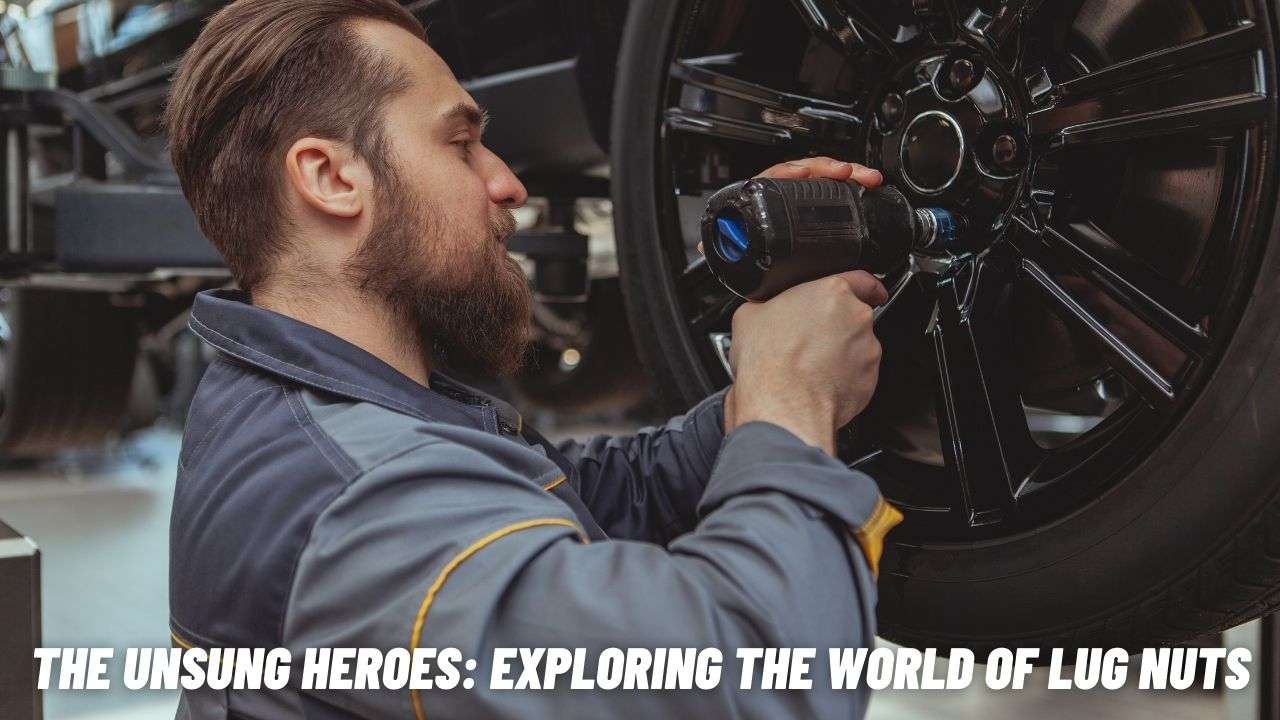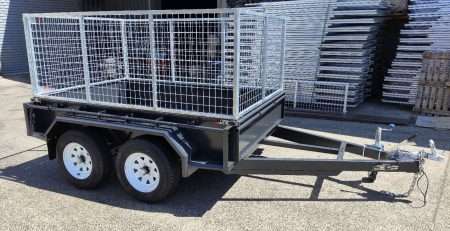
The Unsung Heroes: Exploring the World of Lug Nuts
Understanding Lug Nuts
To thoroughly grasp the world of lug nuts, it’s vital to start with a basic understanding of what they are and the different types that exist on the market.
What are lug nuts?
Lug nuts are the fasteners that secure the wheel to the vehicle’s hub and are essential for proper wheel installation and safety (Discount Tire). They fasten a wheel’s hub to threaded wheel studs on the vehicle’s axle, securing the wheel in place and centring it properly on the axle.
Lug nuts have a rounded or conical (tapered) end and are used on steel and most aluminium wheels. Some designs use lug bolts or wheel bolts instead of nuts, depending on the design of the wheel and the vehicle.
Types of Lug Nuts
There are various types of lug nuts available, each designed to fit different types of wheels and vehicles. The three primary types include conical seats, ball seats, and flat seat lug nuts.
Conical Seat Lug Nuts: These are the most commonly used type of lug nuts. They have a cone-shaped seat that matches the wheel’s lug hole. This design ensures a secure and centred fit on the wheel.
Ball-Seat Lug Nuts: As the name suggests, these lug nuts have a rounded or ball-shaped seat. They are commonly used on specific types of aftermarket wheels and certain European vehicles.
Flat-Seat Lug Nuts: These lug nuts have a flat seat and are typically used with a washer. They are commonly found on older domestic vehicles and some trailers.
Knowing the type of lug nuts your vehicle needs is crucial for safe and proper wheel installation. Always refer to your vehicle’s owner’s manual or consult with a professional if you’re unsure. For more information on wheel and tyre accessories, check out our articles on wheel locks, tyre pressure gauges, and tyre chains for snow.
Importance of Proper Lug Nut Installation
Proper installation of lug nuts is a critical aspect of vehicle safety and performance. This includes adhering to the correct torque specifications and following the proper installation sequence.
Proper Lug Nut Torque
Applying the right amount of torque when tightening lug nuts ensures a secure and balanced fit for the wheel. It’s recommended to use a calibrated torque wrench to achieve the manufacturer’s specified torque rating, which usually falls between 80 and 100 ft-lbs.
Over-tightening lug nuts can warp brake rotors, strain wheel studs, and potentially lead to a dangerous wheel-off situation. On the other hand, under-tightening may lead to the wheel becoming loose over time.
To maintain the correct torque, routinely checking your lug nuts with a torque wrench is advised. This is especially important after a tyre rotation, installation, or when using wheel spacers, as these actions can alter the lug nut torque.
Lug Nut Installation Sequence
In addition to the correct torque, the sequence of installation plays a crucial role in maintaining the integrity of the wheel and tyre assembly. Lug nuts should be installed and tightened in an alternating star pattern to ensure a uniform distribution of load across the wheel mounting surface (Wikipedia). This pattern helps to ensure even stress distribution and prevents warping of the brake rotor.
The final tightening of lug nuts should be performed with a calibrated torque wrench to ensure an accurate and adequate load. This process helps to avoid uneven pressure and potential damage to the wheel or brake components.
Correct lug nut installation is crucial for maintaining the safety and performance of your vehicle. Regular inspection and maintenance of lug nuts, along with other wheel and tyre components like tyre pressure sensors and tyre chains for snow, can significantly contribute to a smooth and safe driving experience.
Lug Nut Maintenance
Maintaining the condition of lug nuts is a crucial part of vehicle upkeep. This process involves regular inspection of the lug nuts and replacing them when necessary.
Regular Lug Nut Inspection
Regular maintenance is necessary to ensure the lug nuts are tight and secure, as loose lug nuts can cause the wheel to come off while driving (Discount Tire). It is important to regularly check the tightness of lug nuts after driving a few miles, especially after a wheel change or tyre rotation.
Also, routinely inspecting the lug nuts for any signs of damage or irregularities is essential. Lug nuts should be free from cracks, corrosion, and stripping. Any damaged lug nuts need to be replaced immediately to ensure the safety and performance of the vehicle.
During inspection, also consider the use of a tyre pressure gauge to ensure your tyres are at the correct pressure, which can also impact the performance and safety of your vehicle.
Replacing damaged lug nuts
If, during the inspection, any lug nuts are found to be damaged or worn, it is crucial they be replaced immediately. Loose or damaged lug nuts can lead to wheel separation and pose a significant safety risk.
Replacing the lug nuts involves removing the old, damaged ones and installing new ones tightly in place. Lug nuts should be tightened according to the vehicle manufacturer’s recommended torque specification, which can be found in the vehicle’s owner’s manual (NAPA Know-How).
Remember, when it comes to wheel and tyre safety, never compromise. Always ensure you have a tyre repair kit handy, and consider additional tyre and wheel accessories like wheel locks and wheel spacers for enhanced safety and performance.
Regular lug nut maintenance will not only ensure the safe operation of your vehicle but also extend the life of your wheels and tyres, providing a smoother and safer ride.
Lug Nut Material Choices
The choice of lug nuts can significantly impact the performance of your wheels. Various materials can be used to manufacture lug nuts, with each offering distinct advantages and disadvantages. This section will delve into the details about the most common lug nut materials: steel, aluminium, and titanium.
Steel Lug Nuts
Steel lug nuts are a common choice due to their strength and durability. They are typically made of chrome-plated steel, which not only enhances their appearance but also provides a layer of protection against rust and corrosion (Sun Devil Auto).
The most common type of steel lug nut is the hex nut, which features a hex-shaped head that threads onto the wheel stud to secure the wheel in place.
However, it’s essential to note that lug nuts with nylon inserts, commonly known as “acorn nuts,” are not recommended for high-performance or off-road applications, as they are prone to stripping and can easily come loose (YourMechanic).
Aluminium and Titanium Lug Nuts
For those seeking a lightweight option, aluminium lug nuts are an attractive choice. These lug nuts are lighter than their steel counterparts, providing a slight advantage in terms of fuel efficiency and performance. They are typically anodized for added corrosion resistance and aesthetic appeal.
Titanium lug nuts, on the other hand, offer the best of both worlds. They are light, like aluminium, but they also have the strength and durability of steel. This makes them an excellent choice for high-performance applications where every ounce matters.
Regardless of the material you choose, it’s crucial to ensure that your lug nuts are the correct size, taper, and thread pitch for your wheels.
By understanding the different materials available for lug nuts, you can make an informed decision that best suits your specific needs, whether you’re a small business owner, a transport company, or a trailer enthusiast. Don’t forget to check out our articles on tyre chains for snow, wheel locks, and wheel spacers for more information on other essential wheel and tyre accessories.
Role of Lug Nuts in Aesthetics
While lug nuts are essential for maintaining the safety and performance of a vehicle, they also play a significant role in its aesthetics. The right lug nuts can enhance the overall look of a vehicle, allowing owners to express their personal style and add a unique touch to their ride.
Style Options for Lug Nuts
Lug nuts come in various styles and finishes, ranging from the classic and understated to the bold and eye-catching. They can be customised to match the style and theme of a vehicle, with options such as coloured lug nuts, spiked lug nuts, or lug nuts with unique patterns or designs available. Whether your vehicle is a classic car, a sports car, or a lifted truck, there are lug nut options to suit every style and preference (Driving Line).
| Lug Nut Style | Description |
|---|---|
| Coloured Lug Nuts | Available in various colours, these lug nuts can match or contrast with your vehicle’s paint job for a customised look. |
| Spiked Lug Nuts | These lug nuts feature a spiked design for a bold, aggressive look. They’re often used on trucks and off-road vehicles. |
| Patterned or designed lug nuts | These lug nuts feature unique patterns or designs for a distinctive look. They can be a great way to express your personal style. |
Enhancing Vehicle Look with Lug Nuts
Just as accessories can enhance an outfit, the right lug nuts can enhance the look of a vehicle. Custom lug nuts can be a great way to add a personal touch and make your vehicle stand out from the crowd. They offer an opportunity to express personal style and enhance the visual appeal of a vehicle. With a wide range of finishes, colours, and designs available, lug nuts can be a statement accessory that complements the overall aesthetics of the vehicle (Sun Auto Service).
In addition to selecting the right lug nuts, other wheel accessories like hubcaps, wheel locks, and wheel spacers can also significantly impact the appearance of your vehicle.
Remember, while aesthetics are important, the primary function of lug nuts is to secure the wheels to the vehicle. Therefore, always prioritise the quality and correct fit of lug nuts over style.
Lug Nuts and Vehicle Safety
Safety is paramount when it comes to automotive parts, and lug nuts are no exception. These small but critical components play a pivotal role in keeping the wheels securely attached to the vehicle. Let’s explore the risks associated with loose lug nuts and the importance of the correct lug nut fit.
Risks of Loose Lug Nuts
Loose lug nuts pose a significant risk as they can cause the wheel to detach while the vehicle is in motion. Regular maintenance is, therefore, essential to ensure the lug nuts are appropriately tightened.
Additionally, both over-tightening and under-tightening lug nuts can lead to problems. Over-tightening can cause damage to the wheel studs, while under-tightening may result in wheel wobble and potential detachment. It is thus crucial to strike a balance when tightening lug nuts.
One must also regularly check the tightness of lug nuts after driving a few miles, especially after a wheel change or tyre rotation. Utilising tools like a tyre pressure gauge or a tyre pressure sensor can help in maintaining overall tyre health alongside the lug nuts.
Importance of Correct Lug Nut Fit
Having the correct fit for lug nuts is equally important for vehicle safety. Lug nuts vary in size, taper, and thread pitch, and the type used depends on the wheel or purpose of the application.
For instance, the commonly used hex nut features a hex-shaped head that threads onto the wheel stud to secure the wheel in place. Another popular type is the conical seat lug nut, which has a cone-shaped lug seat with a 60-degree taper. This design self-centres the lug onto the wheel when tightened down and is often used for aftermarket wheels with 60-degree tapered lug holes.
It’s crucial to ensure that the lug nuts are compatible with the wheel assembly to ensure a secure fit and prevent potential safety issues. Additionally, consider the material of the lug nuts, as they can be made from steel, chrome-plated, or lightweight materials like aluminium or even titanium.
Remember, proper installation and regular maintenance of lug nuts play a vital role in ensuring a smooth and safe ride. For more information on related accessories, check out our articles on wheel locks, wheel spacers, and hubcaps.
Author
I am Rahatul Ashiq Tamal. Another author of Muscle Trailers. Muscle Trailers is a well-known trailer brand in Sydney, Melbourne & Adelaide

How to Mount a Spare Tire on Your Trailer: A Simple Step-by-Step Guide
Trailer service centers receive over 1 million phone calls and 1.3 million emails each year about trailer maintenance problems....

How to Fix RV Roof Leaks: Simple Roof Leak Detection Guide for Beginners
Did you know DIY RV roof repairs can cost under $50? But undetected leaks could lead to substantially higher repair...

Starting a Food Truck Business in Australia: From Trailer Selection to Launch
The Australian mobile food market has evolved into a billion-dollar industry. This makes a food truck...
